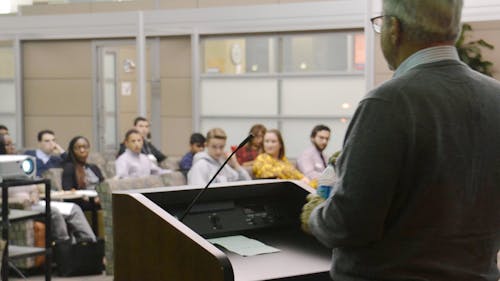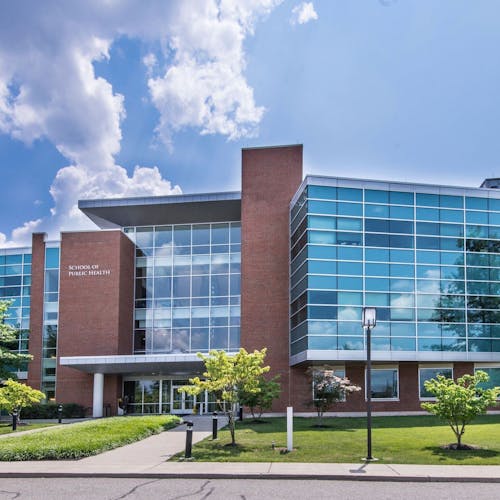RUSA information sessions prepare students for upcoming elections

Over the next two weeks, members of the University community can campaign for seats on next year’s Rutgers University Student Assembly (RUSA).
Students can run for RUSA positions for the upcoming academic year, with elections occurring between March 22 and March 24, said Elections <g><g>Chair</g></g> Anish Patel. They must declare their intent to run by March 19 — and to help them, RUSA hosted three information sessions on March 6 and 7.
“The info sessions are about the RUSA spring elections, how to run, how to campaign, suggestions, ideas (and) what it’s like to be a RUSA representative,” the School of Arts and Sciences senior said. “It’s just an opportunity to ask whatever questions (students have) like about the organization before they run for office.”
Students can campaign until March 24, when the elections formally end. The winners will be announced on March 30, he said. Those who earn a spot will be sworn in on April 6 and will formally begin their term the following week.
Anyone who is voted into office should expect to commit at least 6 to 8 hours per week, Patel said.
Participating in the assembly is a commitment, said RUSA V<g>ice President</g> Evan Covello in an email. He is running for president of next year’s body.
“There are many different projects and opportunities to make the student experience better, which take time, but that time put in can be very rewarding,” the School of Arts and Sciences junior said. “But work-life balance is very important as well, and members of our Assembly are encouraged to take time for themselves when needed.”
Students need to be committed to RUSA if they intend to serve, said Public Relations C<g>hair </g>Vladimir Carrasco. The School of Arts and Sciences sophomore is also running for president for this upcoming year.
Participating within the governing body can be as difficult as taking another class at Rutgers, he said in an email.
“To work on projects like attaining a universal iClicker for students one must be able and willing to attend long meetings and put in <g>time</g> for reports that take hours,” he said.
Candidates should be able to communicate with their fellow students, Covello said. He advises people contemplating a run to talk to students to understand what they want to see happen on campus.
The most important part about serving in RUSA is being able to understand the problems that students face, he said.
“Don’t assume the problems, make an effort to hear what the problems are directly from the student body,” he said. “That way of thinking helped me personally to grow as a student leader.”
Students should make sure that if they run and win a position on the assembly, they remain dedicated to accomplishing their goals, Carrasco said. Some people either forget or are unable to achieve their ideas after they are elected, but a student who believes they can make a difference should commit.
“There are many things to consider,” he said. “Before you decide to run, not only should you think about the issues you want to work on, but also what those who elect you find important. One must be aware that once elected you don't only represent your own views but the (also) concerns of thousands of students.”
While any student can run for a position at RUSA, there are a few restrictions on which positions they can run for, Patel said.
Some are based on which school a student is in within Rutgers, while others are based on where a student lives or what year they are in, he said.
“There’s restrictions based on what kind of student you are. For example, RUSA only controls the (School of Arts and Sciences) delegation of the Senate so they only control (those) senators,” he said. “There’s restrictions based on where you live and your year, so we have the Class of 2020 Livingston representatives, who represent the first-year class from Livingston.”
Some positions are restricted to students who have already served as part of RUSA for a year, including the <g>presidency</g>, he said.
“The University-wide positions require a year of service, that’s the minimum constitutional requirement. Except for anything else specific, those are the only restrictions,” Patel said. “Also a 2.5 GPA … anything you need to participate in the Office of Student Involvement, you need to participate in RUSA.”
Candidates who declare by March 19 can be eligible for donation-matching for any funds they raise. But these funds must be donated by Rutgers students to be <g>eligible</g>, Patel said.
Students can find more information about running online at RUSA’s website, or email Patel at rusa.elections@gmail.com to get started.
“If you are considering on running, do it for the right reasons,” Carrasco said. “Join because you have a passion for giving back to the community, do it because you believe you will make a difference and will resist falling into any complacency.”
Nikhilesh De is a correspondent for The Daily Targum. He is a School of Arts and Sciences senior. Follow him on Twitter @nikhileshde for more.



